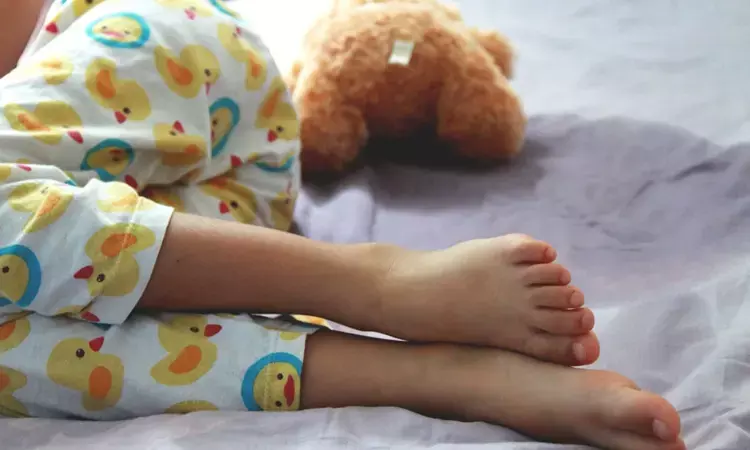- Home
- Medical news & Guidelines
- Anesthesiology
- Cardiology and CTVS
- Critical Care
- Dentistry
- Dermatology
- Diabetes and Endocrinology
- ENT
- Gastroenterology
- Medicine
- Nephrology
- Neurology
- Obstretics-Gynaecology
- Oncology
- Ophthalmology
- Orthopaedics
- Pediatrics-Neonatology
- Psychiatry
- Pulmonology
- Radiology
- Surgery
- Urology
- Laboratory Medicine
- Diet
- Nursing
- Paramedical
- Physiotherapy
- Health news
- Fact Check
- Bone Health Fact Check
- Brain Health Fact Check
- Cancer Related Fact Check
- Child Care Fact Check
- Dental and oral health fact check
- Diabetes and metabolic health fact check
- Diet and Nutrition Fact Check
- Eye and ENT Care Fact Check
- Fitness fact check
- Gut health fact check
- Heart health fact check
- Kidney health fact check
- Medical education fact check
- Men's health fact check
- Respiratory fact check
- Skin and hair care fact check
- Vaccine and Immunization fact check
- Women's health fact check
- AYUSH
- State News
- Andaman and Nicobar Islands
- Andhra Pradesh
- Arunachal Pradesh
- Assam
- Bihar
- Chandigarh
- Chattisgarh
- Dadra and Nagar Haveli
- Daman and Diu
- Delhi
- Goa
- Gujarat
- Haryana
- Himachal Pradesh
- Jammu & Kashmir
- Jharkhand
- Karnataka
- Kerala
- Ladakh
- Lakshadweep
- Madhya Pradesh
- Maharashtra
- Manipur
- Meghalaya
- Mizoram
- Nagaland
- Odisha
- Puducherry
- Punjab
- Rajasthan
- Sikkim
- Tamil Nadu
- Telangana
- Tripura
- Uttar Pradesh
- Uttrakhand
- West Bengal
- Medical Education
- Industry
Reduced Caffeine intake can improve bed wetting in school kids: BMJ

A new study published in BMJ Paediatrics shows that restricting caffeine may assist to lessen primary monosymptomatic nocturnal enuresis (PMNE) or its symptoms.
The most typical kind of nocturnal enuresis (NE) in children of school age is primary monosymptomatic NE. Although there are several drugs that may be used to treat PMNE, behavioral interventions—such as eliminating constipation before night, consuming less salt, protein, and fluids during dinner, especially before bed—are the first-line treatments. According to several studies, coffee has diuretic effects and increases urine output, which aggravates incontinence. Evidence regarding caffeine's detrimental impact on pediatric enuresis is either understudied or poorly understood. As a result, Sadra Rezakhaniha and colleagues carried out this study to find out how caffeine limitation affects the severity and improvement of primary monosymptomatic nocturnal enuresis.
From 2021 to 2023, two referral hospitals in Tehran, Iran, participated in this randomized clinical study. For this study, 534 PMNE kids between the ages of 6 and 15 (one group of 267) were involved. The feed frequency questionnaire recorded how much caffeine was consumed, and Nutrition 4 software assessed how much was consumed. The daily caffeine intake in the intervention group was less than 30 mg, compared to 80–110 mg in the control group. One month later, all kids were invited to come back and examine the data that had been recorded.
The key findings of this study were:
1. The intervention and control groups' respective mean ages were 10.92.3 and 10.52.5 years.
2. Prior to caffeine limitation, the intervention and control groups' respective mean bed-wetting rates were 3.5 (SD 1.7) and 3.4 (SD 1.9) times/week and, 1 month later, 2.3 (SD 1.8) and 3.2 (SD 1.9) times/week, respectively (p=0.001).
3. Restricting caffeine in the intervention group considerably lessened the severity of enuresis.
4. With RR 0.615 at 95% CI 0.521 to 0.726, p=0.001, 54 children (20.2%) in the caffeine restriction group improved (dry at night), compared to 18 children (6.7%) in the control group.
5. Children's enuresis was greatly decreased by caffeine restriction, with a 7.417 number-needed-to-treat benefit.
One of the first-line management strategies for PMNE is the constructive restriction of caffeine and, the first method for defining hints for enhancing PMNE and severity was through this study.
Reference:
Rezakhaniha, S., Rezakhaniha, B., & Siroosbakht, S. (2023). Limited caffeine consumption as first-line treatment in managing primary monosymptomatic enuresis in children: how effective is it? A randomised clinical trial. In BMJ Paediatrics Open (Vol. 7, Issue 1, p. e001899). BMJ. https://doi.org/10.1136/bmjpo-2023-001899
Neuroscience Masters graduate
Jacinthlyn Sylvia, a Neuroscience Master's graduate from Chennai has worked extensively in deciphering the neurobiology of cognition and motor control in aging. She also has spread-out exposure to Neurosurgery from her Bachelor’s. She is currently involved in active Neuro-Oncology research. She is an upcoming neuroscientist with a fiery passion for writing. Her news cover at Medical Dialogues feature recent discoveries and updates from the healthcare and biomedical research fields. She can be reached at editorial@medicaldialogues.in
Dr Kamal Kant Kohli-MBBS, DTCD- a chest specialist with more than 30 years of practice and a flair for writing clinical articles, Dr Kamal Kant Kohli joined Medical Dialogues as a Chief Editor of Medical News. Besides writing articles, as an editor, he proofreads and verifies all the medical content published on Medical Dialogues including those coming from journals, studies,medical conferences,guidelines etc. Email: drkohli@medicaldialogues.in. Contact no. 011-43720751


